Advertisements
Can Dogs Eat Watermelon? Benefits, Safety, Feeding Tips & How Much Is Safe
Hi, I'm Riley! As a Canadian pet owner with years of experience caring for both dogs and cats, I understand how tempting it is to share our favorite summer fruits with our furry companions. Watermelon, that quintessential warm-weather snack, often raises questions among responsible pet owners.
Through extensive research and consultations with veterinary nutritionists, I've compiled this practical guide to help you safely share watermelon with your dog.
This evidence-based resource will help you make informed decisions about incorporating watermelon into your dog's diet, especially during our hot Canadian summers when keeping pets hydrated is crucial.
Table of contents
Can Dogs Eat Watermelon?
Understanding the Basics
Let's start with the big question: can dogs eat watermelon? The short answer is yes, they can! Watermelon is a delicious and hydrating fruit that many dogs enjoy. However, like with any human food, there are some important considerations to keep in mind.
Nutritional Profile of Watermelon
Watermelon is packed with nutrients that can be beneficial for dogs. It's low in calories and high in vitamins A, B6, and C, as well as potassium. These nutrients can support your dog's immune system, vision, and overall health. Plus, watermelon is mostly water, making it a great way to keep your pup hydrated, especially on hot summer days.
Potential Risks and Precautions
While watermelon is generally safe for dogs, there are a few things to watch out for. The rind and seeds can be choking hazards or cause digestive issues, so it's important to remove them before feeding watermelon to your dog. Additionally, some dogs may have allergies or sensitivities to certain foods, so it's always a good idea to introduce new foods gradually and monitor your dog for any adverse reactions.
Real-Life Examples
I've personally given my dog small pieces of watermelon as a treat, and he absolutely loves it! I make sure to remove the seeds and rind first, and I only give him a small amount at a time. It's a great way to reward him for good behavior or to cool him down on a hot day.
Common Misconceptions
One common misconception is that all fruits are safe for dogs. While many fruits are okay in moderation, some can be toxic, like grapes and raisins. It's important to do your research and consult with your veterinarian before introducing any new foods to your dog's diet.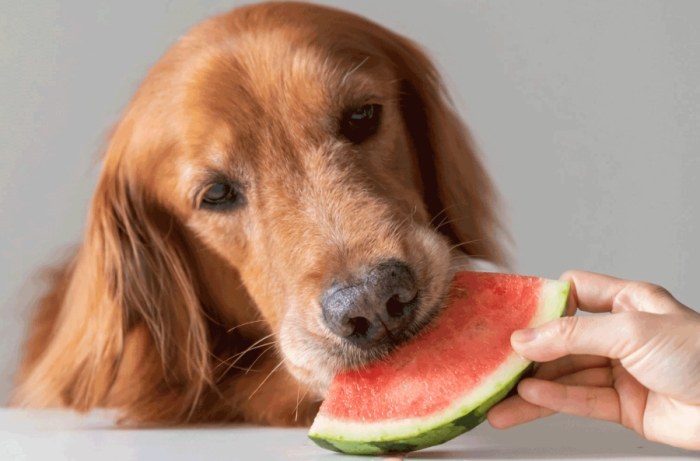
Health Benefits of Watermelon for Dogs
Hydration
One of the most obvious health benefits of watermelon for dogs is its high water content. Dogs can get dehydrated just like humans, especially during hot weather or after exercise. Feeding your dog watermelon can help keep them hydrated and prevent heatstroke.
Vitamins and Minerals
Watermelon is rich in vitamins A, B6, and C, as well as potassium. These nutrients play important roles in your dog's health. Vitamin A supports vision and immune function, vitamin B6 is essential for brain development and function, and vitamin C is an antioxidant that helps protect cells from damage. Potassium is important for maintaining proper muscle and nerve function.
Antioxidants
Watermelon contains antioxidants like lycopene, which can help protect your dog's cells from damage caused by free radicals. Free radicals are unstable molecules that can contribute to aging and disease. Antioxidants can help neutralize these molecules and reduce the risk of health problems.
Fiber
Watermelon also contains a small amount of fiber, which can help support your dog's digestive health. Fiber can promote regular bowel movements and prevent constipation. However, it's important not to overdo it, as too much fiber can cause diarrhea.
Real-Life Stories
I've heard from other dog owners who swear by watermelon as a healthy treat for their pups. One friend's dog has a sensitive stomach, and she finds that watermelon is easy on his digestive system and helps keep him regular. Another friend's dog loves watermelon so much that she uses it as a training treat, and he's always eager to learn new tricks in exchange for a piece of juicy watermelon.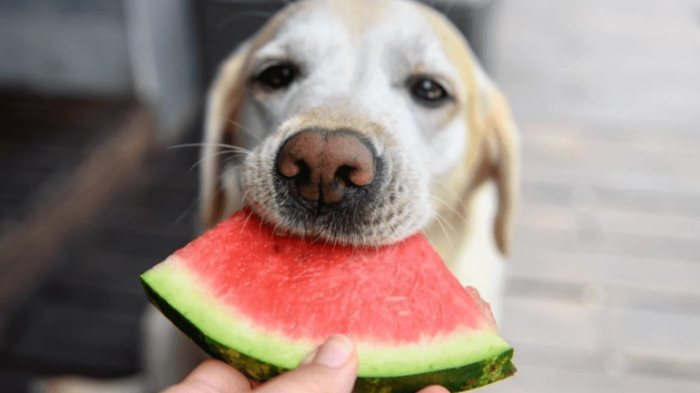
How Much Watermelon Can I Give My Dog?
Portion Control
Now that we know watermelon can be a healthy treat for dogs, the next question is: how much watermelon can I give my dog? The answer depends on your dog's size, age, and overall health. As a general rule of thumb, treats should make up no more than 10% of your dog's daily caloric intake.
Small Dogs
For small dogs, a few small pieces of watermelon (about the size of your thumbnail) should be plenty. You don't want to overfeed them, as this can lead to digestive upset or weight gain.
Medium Dogs
Medium-sized dogs can have a bit more watermelon, but still in moderation. A few larger pieces (about the size of a quarter) should be sufficient.
Large Dogs
Large dogs can handle slightly larger portions of watermelon, but it's still important to be mindful of their overall calorie intake. A few slices (about the size of a half-dollar) should be enough to satisfy their cravings without going overboard.
Frequency
It's also important to consider how often you give your dog watermelon. While it's a healthy treat, it shouldn't be given every day. Once or twice a week is usually sufficient. Remember, treats should be just that—treats—not a regular part of your dog's diet.
Monitoring Your Dog
Every dog is different, and some may be more sensitive to certain foods than others. It's important to monitor your dog for any adverse reactions after giving them watermelon. If you notice any signs of digestive upset, such as vomiting, diarrhea, or gas, it's best to avoid giving them watermelon in the future.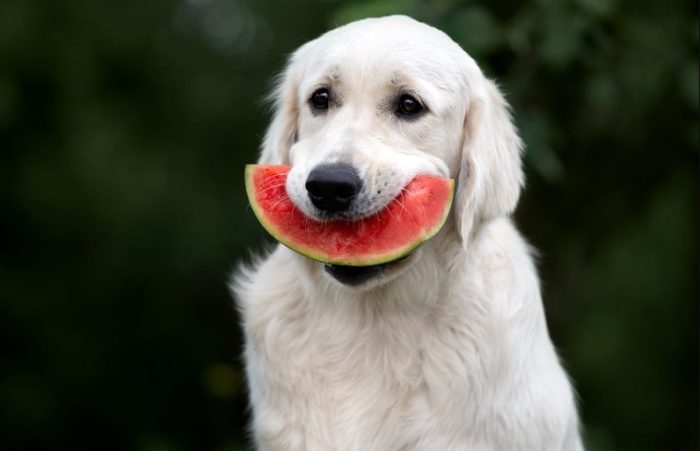
How to Feed Watermelon to Your Dog
Preparation
Before feeding watermelon to your dog, it's important to prepare it properly. Start by washing the watermelon thoroughly to remove any dirt or pesticides. Then, cut off the rind and remove the seeds. The rind and seeds can be choking hazards or cause digestive issues, so it's best to play it safe and remove them.
Serving Suggestions
Once you've prepared the watermelon, you can serve it to your dog in a variety of ways. Here are a few ideas:
- Frozen Treats: Cut the watermelon into small cubes and freeze them for a refreshing summer treat.
- Puree: Blend the watermelon into a puree and pour it into an ice cube tray for a fun and healthy snack.
- Mixed with Other Foods: You can also mix small pieces of watermelon with your dog's regular food for a bit of added flavor and nutrition.
Creative Recipes
If you're feeling adventurous, you can try making some homemade dog treats using watermelon. Here's a simple recipe to get you started: Watermelon and Yogurt Popsicles
- Ingredients: 1 cup of seedless watermelon, 1/2 cup of plain yogurt, 1 tablespoon of honey (optional)
- Instructions: Blend the watermelon until smooth. Mix in the yogurt and honey (if using). Pour the mixture into ice cube trays or popsicle molds and freeze for several hours or until solid.
Tips for Feeding
When feeding watermelon to your dog, here are a few tips to keep in mind:
- Start Slowly: If your dog has never had watermelon before, start with a small amount to see how they react.
- Watch for Allergies: Keep an eye out for any signs of allergies, such as itching, swelling, or difficulty breathing. If you notice any of these symptoms, stop feeding watermelon to your dog immediately and consult with your veterinarian.
- Avoid Overfeeding: As mentioned earlier, treats should make up no more than 10% of your dog's daily caloric intake. Be mindful of how much watermelon you're giving your dog and adjust their regular meals accordingly.
Real-Life Experiences
I've had a lot of fun experimenting with different ways to feed watermelon to my dog. One of his favorites is frozen watermelon cubes. He goes crazy for them on hot days, and it's a great way to keep him cool and hydrated. I've also tried mixing small pieces of watermelon with his regular food, and he seems to enjoy the added flavor.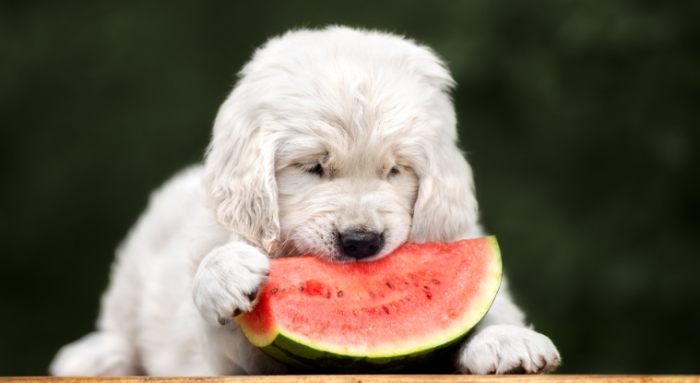
Dietary Safety of Dogs and Watermelon
Choking Hazards
As mentioned earlier, the rind and seeds of watermelon can be choking hazards for dogs. Always remove these parts before feeding watermelon to your dog. If your dog is prone to choking or has a history of digestive issues, it's best to avoid giving them watermelon altogether.
Digestive Issues
Some dogs may have trouble digesting watermelon, especially if they eat too much of it. Signs of digestive upset can include vomiting, diarrhea, gas, or abdominal pain. If your dog experiences any of these symptoms after eating watermelon, it's best to avoid giving it to them in the future.
Allergies
While rare, some dogs may be allergic to watermelon. Signs of an allergic reaction can include itching, swelling, hives, or difficulty breathing. If you notice any of these symptoms, stop feeding watermelon to your dog immediately and consult with your veterinarian.
Pesticides and Chemicals
It's important to choose organic watermelon whenever possible to reduce your dog's exposure to pesticides and other chemicals. If you can't find organic watermelon, make sure to wash the fruit thoroughly before feeding it to your dog.
Consulting with Your Veterinarian
If you're unsure whether watermelon is safe for your dog, or if you have any concerns about their diet, it's always a good idea to consult with your veterinarian. They can provide personalized advice based on your dog's individual needs and health history.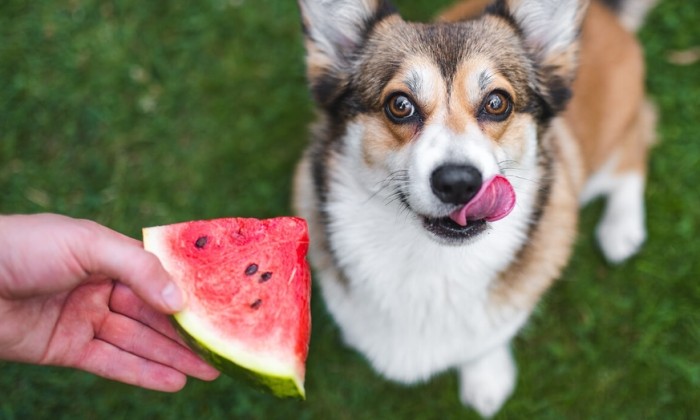
Q&A Section
Can Dogs Eat Watermelon Everyday?
While watermelon can be a healthy treat for dogs, it shouldn't be given every day. As mentioned earlier, treats should make up no more than 10% of your dog's daily caloric intake. Feeding watermelon to your dog every day could lead to weight gain or digestive issues. It's best to limit watermelon to once or twice a week as a special treat.
Can Dogs Eat Watermelon Seeds?
No, dogs should not eat watermelon seeds. The seeds can be a choking hazard or cause digestive issues, such as blockages or irritation. Always remove the seeds before feeding watermelon to your dog.
Does Watermelon Make Dogs' Teeth Whiter?
There's no scientific evidence to suggest that watermelon can make dogs' teeth whiter. However, the crunchy texture of watermelon can help remove plaque and tartar from your dog's teeth, which can contribute to better oral health. Regular dental care, such as brushing your dog's teeth or providing dental chews, is still the best way to keep their teeth clean and white.
Is Watermelon a Laxative for Dogs?
Watermelon contains a small amount of fiber, which can help support your dog's digestive health. However, it's not a powerful laxative and shouldn't be used to treat constipation. If your dog is experiencing constipation, it's best to consult with your veterinarian for appropriate treatment options.
Can Dogs Eat Watermelon Rind?
No, dogs should not eat watermelon rind. The rind can be difficult for dogs to digest and may cause digestive issues, such as vomiting or diarrhea. Always remove the rind before feeding watermelon to your dog.
Leave a Message